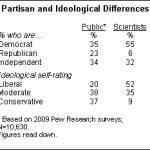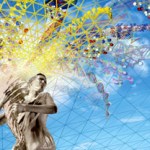science literacy
One paper in the special issue proposes strategies for catalyzing greater collaboration on climate change communication among the "four cultures."
The August issue of the journal Frontiers in Ecology and the Environment features open-access articles that review research, define challenges, and propose new initiatives in the area of science communication with a focus on environmental controversies. Over the past several years, there has been increasing attention to communication and public engagement at flagship science journals. The special issue of Frontiers represents the most…
The announcement of this award is an important step towards greater recognition of the need for public engagement on the part of scientists and their institutions. AAAS should be commended for their commitment to leadership in this area. Details below and here.
It will be interesting to see the criteria by which nominations are judged. As I noted last month, how public engagement is ultimately defined, its goals and outcomes, remains an open question. (See also this comment.)
There is more major news on this front coming in August including the launch of a new blog, and a special issue…
Held in over 30 countries, the World Wide Views on Global Warming initiative represents the state-of-the-art in new approaches to public engagement, the subject of several recent reports and meetings. This video features a short documentary on the Australian event.
Over the weekend, my friend Chris Mooney contributed an excellent op-ed to the Washington Post pegged to an American Academy of Arts and Sciences event yesterday. The op-ed previewed a longer essay by Chris released at the event in which he described some of the major themes expressed in the transcripts of three meetings convened…
At Science today, contributing journalist Yudhijit Bhattacharjee reports on the decision by the National Science Board to drop discussion of survey questions about evolution from their 2010 Science Indicators report. As a reviewer of several previous versions of the report and as an expert who provided input and feedback on the design of the 2006 survey instrument, I have several thoughts on what I think Bhattacharjee in the article unfairly portrays as a "controversy."
The NSB is correct to be concerned about how these questions are interpreted by the public and by the scientific community…
UPDATE: Due to the weather, the Forum is postponed until the end of February or early March. When a date is finalized, I will post details.
Tuesday night at 7pm, American University's School of Communication will be hosting a panel discussion focused on "The Climate Change Generation: Youth, Media, and Politics in an Unsustainable World." [Follow the link for location on campus and directions.]
Joining me on the panel will be the Washington Post's national environmental reporter Juliet Eilperin and Mother Jones energy and environmental reporter Kate Shepard. The panel will be moderated by…
Much calamity has been made in popular books and by liberal commentators about the public's scores on quiz like survey questions tapping basic knowledge of scientific facts or the public's recognition of prominent figures in science.
Yet as social scientists have shown in various studies and have argued, we really shouldn't be surprised by the survey results on science literacy. Nor do studies find that these scores on literacy quizzes account for much of the variance in public opinion and perceptions about science-related debates, especially in comparison to other more influential factors…
In the two days leading up to their annual conference in San Diego later this month, AAAS will be sponsoring a two-day workshop on improving climate change literacy through informal education activities.
I will be participating in one of the panels and I hope to be blogging summaries of the event. Below is a description of the special invitation only conference and go here for an agenda.
More than 150 educators from informal science institutions and projects--including science centers, museums, zoos, and aquariums; media projects; and community programs--will gather in San Diego to expand…
Last week the NSF Science Indicators report was released, triggering more dramatic calls to action and overstated warnings from commentators about the alleged decline of science in American society. This predictable reaction is part of a decades enduring "fall from grace narrative" about the place of science in American society, a distracting if not harmful myth that I discussed in a co-authored article with Dietram Scheufele published earlier this year.
Since Sputnik, each decade has spawned a novel form of this American jeremiad, whether it be the Cold War race against the Russians,…
Slides and synchronized video of the presentations from the AGU panel "Re-Starting the Conversation on Climate Change: The Media, Dialogue, and Public Engagement Workshop" are now online. Below I link to each of the presentations highlighting key themes or conclusions and the minute mark in the video.
Mass Media and the Cultural Politics of Climate Change
Max Boykoff, Ph.D.
University of Colorado-Boulder
Mass media serve vital roles in the communication processes between science, policy-makers and the public. This presentation reviews contextual factors as well as journalistic pressures…
I've been busy the past week with wrapping up the semester. As a consequence, I have not had the chance to post about continuing developments related to the stolen emails from servers at University of East Anglia's Climatic Research Unit (CRU).
However, today is a convenient time to weigh in, since I share many of the same conclusions offered by Mike Hulme in recent op-eds at the BBC and Wall Street Journal.
Before discussing the Hulme articles, let me relay a few observations. Since the stolen email story broke, my concern has been that many bloggers and commentators are overlooking the…
Over at the Columbia Journalism Review, Curtis Brainard previews some of the major themes and proposed initiatives from a new co-authored paper I have appearing at the American Journal of Botany. The article is scheduled for the October issue as part of a special symposium on science education and communication. A pre-publication author proof is available with the final paper online later this month. If you have been following the recent blog debates over science communication but have been looking for more substantive sources, this paper is probably for you. It's also a good introduction to…
Last week I participated in a two-day workshop at NSF on climate change education. The meeting brought together researchers in science education, communication, and informal learning; representatives from government agencies such as NOAA, the EPA, and NASA; and organizations such as the American Geophysical Union and the American Meteorological Society. The presentations and discussions focused not only on school-based settings but also on public engagement campaigns, the news media, and the role of science centers and museums.
Among several participants, there was an emphasis on three…
The initial reviews of Chris Mooney and Sheril Kirshenbaum's new book Unscientific America: How Scientific Illiteracy Threatens our Future produced a small blogospheric kerfuffle last month. But I think Unscientific America has much more constructive and useful things to offer than provoking more arguments, and there are a lot of reviews focusing on the positives. This surprisingly short but wide-ranging book is a nutshell primer on science policy and communication issues, perfect for dissatisfied lab rats who want to engage in advocacy but don't have communications or policy training outside…
As I noted last week, the Pew survey of scientists finds that more than 50% self-identify as liberals compared to just 20% of the public.
Which then leads to the question: what role does ideology play in shaping scientists' policy preferences relative to science, especially in those areas outside of their specialty? Or on those issues where there are high levels of uncertainty about risks, benefits, and trade-offs? Heuristic decision-making is common in politics and policymaking, are scientists as a group any different?
Put another way, in responding to the Pew findings, several commentators…
Over at the liberal blog site Daily Kos, the anonymous "Dark Syde" reviews the book Unscientific America. The review, unfortunately, echoes the all-too-common "fall from grace narrative" about the place of science in American society, a distracting if not harmful myth that we discuss in a forthcoming journal article and that I noted Friday.
All the trademark "fall from grace" metaphors, catchphrases, and references are included in the Daily Kos review including claims about a rise in "anti-science," "know-nothingness," open contempt for science, and a "long national slide into pseudoscience…
Somewhat predictably, several pundits and commentators have framed Thursday's Pew survey as supporting an all too common yet misleading "fall from grace" narrative about the place of science in society.
These interpretations proclaim a "growing disconnect," "a dangerous divide," a "widening gulf" and use other metaphors that are representative of what sociologists might label as a moral panic. This traditional fall from grace narrative about science argues for the need to return to a (fictional) point in the past where science was better understood and appreciated by the public. In the U.S…
[UPDATE: See this follow up on media reaction to the report.]
The Pew Research Center released today a major new survey report documenting Americans' views of science and technology and comparing these lay perceptions to a representative sample of U.S. scientists who are members of AAAS.
As part of a panel of experts, I had the chance to contribute input and ideas on the survey earlier this year. I have been eagerly looking forward to the findings ever since. Below I have jotted down a few key implications that come to mind on my first scan.
I will have more to say next week and probably…
I am back from an excellent science journalism conference in Denmark and will have more to say on the meeting which highlighted several issues that speak directly to challenges faced here in the US. But for now, I wanted to return to our Commentary article "Science Communication Re-Considered" published last week at Nature Biotechnology.
Of particular interest to readers, we discuss the rise of science blogging as just one small part of the complex puzzle which is public engagement. There is a lot to like about blogs but there is also a lot to be cautious about. Importantly, despite great…
Next week there will be big news on the science communication front. In anticipation, I was just going back over some things that I have written on the topic over the past decade. I ran across an essay I wrote for Skeptical Inquirer from 2003, which I posted below the fold. The essay puts into context an interesting debate that took place in the pages of The Guardian between eminent UK scientist Susan Greenfield and science communication professor Jon Turney.
Greenfield's side of the debate reflects a continued dominant line of thinking referred to as the "deficit model," the assumption that…
As I put it at a blogging panel last fall, "in science, it is normative to be not sure." It wasn't my most eloquent moment, but at least AAAS' president-elect Alice Huang agrees with me that one of the biggest challenges to public science literacy is understanding the contingent nature of scientific "truth".
But probably the most difficult concept to get across to nonscientists is that we look at data and then use probabilities to judge those data. The public wants an absolute black-and-white answer. We may look at something that is 80 percent likely as being good enough to base decisions on…

